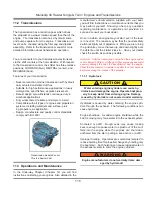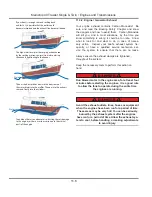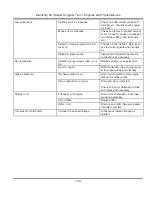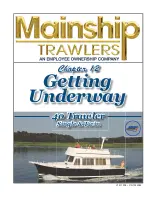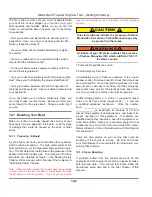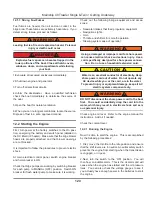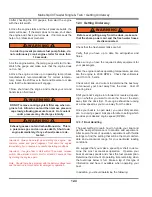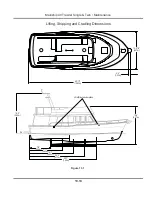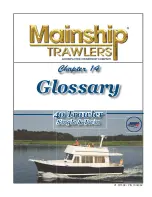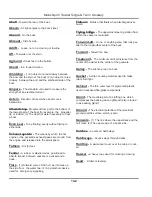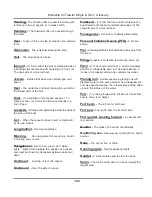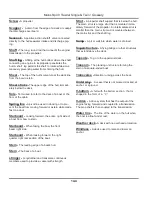
Mainship 40 Trawler Single & Twin • Maintenance
13.3
Before storing your boat, remove loose items such as
cushions, towels, and similar items. Water trapped under
these items can cause gelcoat discoloration and mildew.
After each use, rinse the entire boat with fresh water. If
the boat has been used in brackish or salt water, use a
mild soap during the washdown.
Covering your boat between uses will protect the finish
from direct sunlight. Do not cover it with anything that
will not allow moisture to evaporate, for example, sheet
plastic.
13.2.2 Finish Protection
Waxing two or four times a year is recommended. If you
are in a climate where you use your boat year round, wax
your boat every three months. If you have a summer
boating season, wax at the beginning of the season and
before winter storage.
Waxing helps protect your boat from everyday elements.
Use a wax recommended for fiberglass (gelcoat) finishes.
Many automatic, over-the-counter waxes can be used.
Check the product label for recommended surfaces and
applications.
13.2.3 Color Fading and Yellowing
Darker colors are more prone to fading because they
absorb more of the sun’s ultraviolet rays. Whites and off-
whites will yellow, usually on the deck radii. If the finish
on your boat has started to fade or yellow, and waxing
will not restore the finish, compounding with a fine grit
compound and a low speed buffer may be necessary.
An automotive, fine grit rubbing compound will work well
in most cases.
* Follow the manufacturer’s application instructions. Do
not apply compound or wax in direct sunlight.
* Never place the buffer in such a manner that the pad
touches the ground. The pad will pick up dirt which will
cause deep scratches in the finish.
* After compounding, clean the surface with soap and
water. Apply a good coat of wax.
13.2.3 Minor Scratches
If you have light surface scratches and rubbing compound
does not remove them, wet sanding may be necessary.
** To wet sand:
* Clean the area with soap and water. During sanding,
try to keep the area free of dust and dirt.
* Use a 500 or 600 grit wet and dry sandpaper. Use a
sanding block. Sandpaper and sanding blocks can be
purchased from automotive supply stores.
* When sanding, keep the surface wet. On dry surfaces,
press a wet sponge above the sanding area. Always
keep the sanding block flat on the surface. Never use
the edge or corner. Doing so will make scratches that
rubbing compound will not remove.
* After completing wet sanding, compound the sanded
area with a fine grit rubbing compound. Use a low speed
(1200 – 2800 rpm) buffer. Several applications of rubbing
compound will have to be applied before all the scratches
are removed.
* Apply a good coat of wax.
13.2.4 Stains
You can remove stains using a cleaner specifically made
for gelcoat surfaces. Any cleaner recommended for cul-
tured marble or fiberglass tubs and sinks will work. Most
of these cleaners can be purchased at a grocery store.
If a cleaner does not remove the stain, use a fine grit
rubbing compound. By hand, apply a small amount of
the compound to the stain area. Using a cotton cloth
and medium pressure, rub the compound into the stained
area. After the stain is removed, wash the area with soap
and water and apply a good coat of wax.
13.2.5 Stainless Steel Care
All of us are familiar with the common alloy “Stainless
Steel” that is used for in the construction of so many
marine hardware components. However, most people are
surprised to learn that this nickel, chromium, iron alloy will
indeed corrode and develop rust stains when exposed to
the every day marine environment without due care and
protection.
Corrosion is a natural process that any “Stainless” mate-
rial will present. The good news is that it is easily pre-
vented and cleaned. With the proper care and attention
your boat’s bright work can be kept in mint condition.
To give you the best possible start in caring for your
stainless we have included just the right product with
Summary of Contents for 40 Trawler Single
Page 8: ...Mainship 40 Trawler Single Twin Operator s Manual H This Page Intentionally Left Blank ...
Page 14: ...Notes Mainship 40 Trawler Single Twin Introduction 1 6 ...
Page 18: ...2 4 Mainship 40 Trawler Single Twin Documents and Forms Fig 2 1 ...
Page 23: ...2 9 Mainship 40 Trawler Single Twin Documents and Forms Notes ...
Page 24: ...2 10 Mainship 40 Trawler Single Twin Documents and Forms This Page Intentionally Left Blank ...
Page 33: ...3 9 Mainship 40 Trawler Single Twin Warranty SAMPLE ...
Page 35: ...3 11 Mainship 40 Trawler Single Twin Warranty SAMPLE ...
Page 36: ...Notes 3 12 Mainship 40 Trawler SIngle Twin Warranty ...
Page 37: ...V1 011508 P N 1034082 40 Trawler Single Twin Single Twin Boating Safety Safety Chapter 4 ...
Page 54: ...Mainship 40 Trawler Single Twin Boating Safety 4 18 Notes ...
Page 66: ...Notes Mainship 40 Trawler Single Twin Fuel System 5 12 ...
Page 76: ...Notes Mainship 40 Trawler Single Twin Underwater Gear 6 10 ...
Page 92: ...Mainship 40 Trawler Single Twin DC Electric Systems 7 16 Notes ...
Page 102: ...Mainship 40 Trawler Single Twin AC Electric Systems 8 10 This Page Intentionally Left Blank ...
Page 110: ...Mainship 40 Trawler Single Twin Water Systems 9 8 Notes ...
Page 146: ...Mainship 40 Trawler Single Twin Maintenance 13 14 This Page Intentionally Left Blank ...
Page 151: ......
Page 152: ......
Page 153: ......
Page 154: ......
Page 155: ......
Page 156: ......
Page 157: ......
Page 158: ......
Page 159: ......
Page 160: ......
Page 161: ......
Page 162: ......
Page 163: ......
Page 164: ......
Page 165: ......
Page 166: ......
Page 167: ......
Page 168: ......
Page 169: ......
Page 170: ......

